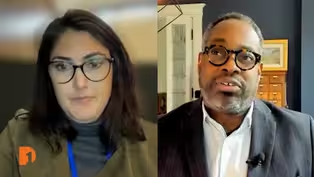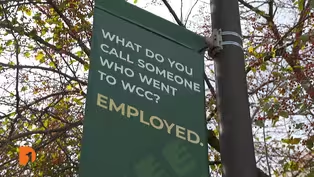
Native American Heritage Month: Michigan indigenous history
Clip: Season 8 Episode 22 | 6m 31sVideo has Closed Captions
Native American Heritage Month serves a as reminder of Michigan’s indigenous history.
Despite indigenous people being the first to have settled in Michigan, not much of the state’s indigenous history is known in the mainstream or taught in schools. For Native American Heritage Month, One Detroit contributor Bryce Huffman talked with Antonio Cosme and Rosebud Bear Schneider to learn about Detroit’s indigenous history and efforts to preserve indigenous traditions today.
Problems playing video? | Closed Captioning Feedback
Problems playing video? | Closed Captioning Feedback
One Detroit is a local public television program presented by Detroit PBS

Native American Heritage Month: Michigan indigenous history
Clip: Season 8 Episode 22 | 6m 31sVideo has Closed Captions
Despite indigenous people being the first to have settled in Michigan, not much of the state’s indigenous history is known in the mainstream or taught in schools. For Native American Heritage Month, One Detroit contributor Bryce Huffman talked with Antonio Cosme and Rosebud Bear Schneider to learn about Detroit’s indigenous history and efforts to preserve indigenous traditions today.
Problems playing video? | Closed Captioning Feedback
How to Watch One Detroit
One Detroit is available to stream on pbs.org and the free PBS App, available on iPhone, Apple TV, Android TV, Android smartphones, Amazon Fire TV, Amazon Fire Tablet, Roku, Samsung Smart TV, and Vizio.
Providing Support for PBS.org
Learn Moreabout PBS online sponsorship[MUSIC] [MUSIC] >> its key, not just the call native people in november, not just the call native people.
when you need a land acknowledgement, you actually have to do the work of building relationships, the native people and also the land.
>> antonio conte's mean rose.
but schneider arbitrators with deep roots in michigan's native american communities.
both work to take care of the land and connect people to its indigenous history.
>> inician abe is in in our language.
it's translated to like the first people.
so we were the first people and have migrated, you know, from from east coast all the way into this area and unsettled here.
>> cause me works with the sugar but project a partnership between the national wildlife federation, the city of detroit and local groups to bring the native american tradition of making maple syrup to more people.
>> as spring starts to come, it's the most beautiful way to watch the transition of the season is to be outdoor in the forest.
with all of your friends and your community working really hard to together maple sap.
what else does this project hope to give to the traders being that we're in a city and we're so disconnected from nature.
it's really, really important that in the little bits of nature that we do have people can form those sorts of like bonds and that are deeper than traditional relationship with nature.
i think a lot of times people recreating in nature, people are camping.
and, you know, that's fine.
i support all sorts of activities, but participating in a traditional ecological activity with with native people in nature is just such a deeper, richer way to plug yourself into the season.
unplug yourself into the ecosystem that we all come from.
schneider is with keep growing to trade.
>> a nonprofit whose mission is to help the traders grow fruits and vegetables in their communities.
she says the organization is currently supporting about twenty-three hundred gardens across the city.
>> this is my second season now with keep her in detroit and and the only emission of in person on staff.
so that comes with great responsibility to to continue to like create a space, not just for myself but for others.
indigenous people in the community.
the need to feel welcome and unconnected to land.
we've partnered with flecks of the land in the sugar bush operation.
we planted a three sisters garden this year.
we've opened up lots of other opportunities for traditionally the la liga logic analogy be shared.
>> blacks of the land is a group of black brown and indigenous nature lovers who helped fellow people of color have meaningful outdoor experiences.
three sisters garden is one that grows corn beans and squash together to enrich the soil and keep pests away.
agriculture was a huge part of life for all indigenous people basically everywhere in the state of michigan and across the country.
what are some growing techniques or ways that you think about food that would benefit of detroiters of all walks of life?
>> not everyone is going to have the green thumb or the capacity to have like a big thriving garden.
that's why, you know, partner with your neighbors like i can grow this.
if you go this and you know, that kind of trading happens.
we do tons of classes where we teach people how to go in containers, how to guns.
you know, in small spaces, there are tons of community gardens that you can tap into and people with love for for neighbors to come out and grow their own food.
and that's the part of like building community is, you know, sharing skills and resources together.
>> and it's like foraging hunting.
there's a lot of ways that you can you don't have to just grow to food.
sovereignty extends into the water into fishing from the river.
so there's a lot of ways it looks, you know, gathering food in and building relationships with the ecosystem are in.
>> unfortunately, a lot of detroiters, myself included, don't really learn a lot about our native ancestry or routes in the city while we're in school.
what's a good way for detroiters to learn about this and connect with it on a deeper level?
>> it's connecting with india's with indigenous communities.
it's seeking out, you know, reading and following indigenous creators and like learning the actual story.
it's within that, you know, it's on us to to learn these things for self.
yes, you can go out and be educated and, you know, asking native friend, you know, all kinds of bringing questions.
but you have you have to take that responsibility.
>> and i think it's there's a lot of ways to get engaged in and in defending the land, getting away from the food systems that are like, you know, making us sick and unhealthy getting into nature.
foraging meeting with native people, tapping into organizations is a lot of ways that people can connect.
and >> talk to me about some of the lessons that natives and black and brown communities have all been kind of learning by themselves, but maybe need to be leaning on each other to learn and teach.
>> i think there's a lot to be said about the ways in which we have to recognize that colonization is an event that happened in the past.
but it's something that's ongoing.
the happening to this very day in the ways that we manage land and the ways that we orient ourselves towards nature in the ways that we separate ourselves from the ecosystems that were a part of and there's a lot of lessons to be learned in that.
i think people do this, but i think my struggles we're sending our struggle.
>> tip of saying they really need to get away from, you know, like the divisive yes, that that is just so prevalent.
and, you know, continue to connect with these things with it, especially with the land.
>> there's always something to be doing in every season that will connect you with what's going on a nature that point.
and it's a it's a beautiful way to honor the earth and to honor yourself in honor the land of the native people of this land to participate in those seasonal harvesting activities.
you know, ends in spring a mother's day.
black land is going to be doing silver bass run.
you know, we'll be doing out there.
walleye fishing, too.
so, you know, just like think about how the ways in which the season brings abundance in tapping into that abundance is a is a really awesome way to disconnect yourself from the food system into something that's like much deeper.
Family Caregivers Month with the Area Agency on Aging 1-B
Video has Closed Captions
Clip: S8 Ep22 | 8m 5s | The Area Agency on Aging 1-B talks about the resources and support for family caregivers. (8m 5s)
One Detroit Weekend: December 1, 2023
Video has Closed Captions
Clip: S8 Ep22 | 1m 51s | Here are eight winter-themed events to check out around Southeast Michigan this weekend. (1m 51s)
Washtenaw College battles brain drain with new FAME program
Video has Closed Captions
Clip: S8 Ep22 | 5m 38s | Brain drain: Washtenaw Community College’s FAME program connects students to careers. (5m 38s)
Providing Support for PBS.org
Learn Moreabout PBS online sponsorship
- News and Public Affairs

Top journalists deliver compelling original analysis of the hour's headlines.

- News and Public Affairs

FRONTLINE is investigative journalism that questions, explains and changes our world.












Support for PBS provided by:
One Detroit is a local public television program presented by Detroit PBS


